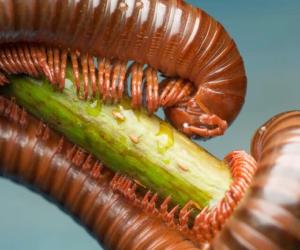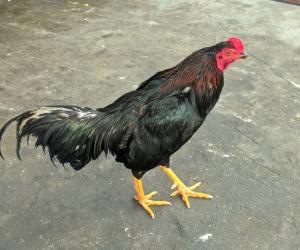The 15 Most Common Health Issues Found in Cockapoos
Cockapoos are a cross between a poodle and a cocker spaniel. You may also see them called cockapoodles or cockerpoos. These are very popular and friendly dogs who have playful personalities. Because they are a mixed breed, they escape some of the inherited conditions associated with purebred dogs. This makes them generally healthy pets. They are also considered low maintenance and many of them have low-shedding coats. That said, they are prone to some health conditions. Some of these are inherited from either their cocker spaniel or poodle parent. Others are associated with their lifestyle. Here is a list of some of the most common health issues in cockapoos.
1.Luxating Patella
The patella is the scientific name for the kneecap. When it luxates, it pops out of its normal position. This is an inherited condition and can occur in dogs of any age. You may notice that your dog is walking on three legs or skips a little. It can then pop back in – and the dog will be walking around as normal. It is caused by the ligaments being incorrectly located. In severe cases, the kneecap is permanently out of position. Also, in some dogs, both knees are involved. With surgical repair, most dogs can lead a happy life. However, it can reoccur after surgery.
2.Hip Dysplasia
This is an inherited deformity of the hip where the ball at the head of the thigh bone does not fit correctly into the socket of the pelvis. The severity of the condition is affected by factors such as diet, exercise, growth rate, and hormones. Over-exercising at a young age may increase the risk which may explain why active cockapoos can be susceptible. Dogs with hip dysplasia are treated with painkillers and physical therapy. Some owners find that veterinary-approved joint supplements are helpful. In the most severe cases, surgery may be recommended.
3. Itchy or Inflamed Ears

©Emma Slade/Shutterstock.com
All dogs can suffer from ear problems. Dogs have an L-shaped ear canal in which it is easy for water and other debris to become trapped. Cockapoos have floppy ears and this makes them even more prone to ear infections. There are a range of potential causes including allergies, ear mites, and trapped water. This can lead to an excessive buildup of earwax and an overgrowth of yeast or bacteria. Dogs with ear problems will usually obsessively scratch and paw at their ears. You may notice them holding their head to one side and there may be an unpleasant odor, or even discharge, coming from the affected ear. You need to take your cockapoo to a vet so that the cause of the problem can be established and the appropriate treatment started. Many ear problems in cockapoos can be prevented with correct hygiene.
4.Hereditary Cataracts
Both poodles and cocker spaniels are breeds that are prone to developing cataracts so it is inevitable that cockapoos will also be at risk. Cataracts make the lens of the eye cloudy so that the dog gradually loses their vision. Whilst it can happen from birth, it often develops in middle-aged dogs. The only effective treatment is surgery which removes the diseased material from inside the lens. Following the operation, your dog may need to use eyedrops for the rest of their life.
5.Progressive Retinal Atrophy
Progressive retinal atrophy (PRA) is a genetic condition seen in both poodles and cocker spaniels. It affects the retina at the back of the eye and begins with a loss of night vision, eventually ending with total blindness. However, the progression of the disease is gradual and dogs often adjust to it. Dogs with PRA have opaque eyes but it is not painful. There is no treatment. However, by making some adjustments to your home and lifestyle a dog with this condition can still lead a happy life.
6.Glaucoma
Cocker spaniels are prone to primary glaucoma and any dog can develop secondary glaucoma following conditions such as inflammation or cataracts. It is a painful eye condition where the pressure builds up in the eyeball and damage is caused to the optic nerve. If not treated promptly, it will eventually cause blindness. Affected dogs are treated with eyedrops but some can have eye surgery. With appropriate treatment, the outcome is usually positive.
7.Corneal Ulcerations

©Lee Ph/Shutterstock.com
Corneal ulcers are basically an ulcer on the surface of the eye. Some are just minor grazes but others are deeper and much more serious. They can be caused by injuries, infections, and in-turning eyelids. They can also be caused by a condition called ‘dry eye’ where the dog is not able to produce normal tears. Corneal ulcers are a painful condition that will get worse quickly if they are not treated. Your dog may have red, inflamed, and bloodshot eyes or they may be closing their eye or squinting. Your vet will want to get to the bottom of what has caused the ulcer in the first place. Cockapoos with longer hair around their faces may be more likely to develop this condition as are those that like running through vegetation.
8.Retinal Dysplasia
Retinal dysplasia is an inherited condition commonly found in cocker spaniels so cockapoos may inherit it. It causes changes to the retina at the back of the eye and may affect vision but is not painful. You may notice that your dog hesitates to jump off things and may bump into objects. In the early stages of the disease, it causes very few symptoms and so it is often not diagnosed until it is advanced. There is no treatment but you can help your dog to adjust to living with vision problems. They often learn to rely on their hearing and smell instead.
9.Allergies

©Yuriy Golub/Shutterstock.com
Allergies are very common health issue in cockapoos. They can be allergic to house mites, pollen, grass, household cleaners, and many different types of food. Many cockapoos require a special diet because any dog food containing grains, soy, wheat, beef, and poultry can cause a problem. The allergy often causes itchy skin and itchy ears. You may notice that your dog is biting and licking their paws obsessively. Often, you can work with your vet to establish the source of the allergy. You may need to switch to a new protein source for their food. Some dogs require steroids or treatment with antihistamines. Allergies can develop in dogs of any age.
10.Familial Nephropathy
This is an inherited disease found in cocker spaniels and hence in cockapoos. It presents as early-onset kidney failure because affected dogs are born with abnormal structures inside their kidneys. Dogs with the condition are very thirsty, urinate a lot, and have a loss of appetite. There is no cure for this condition but some treatments may be able to slow down the rate of kidney damage. Specialized diets may be useful in some dogs. However, treatments are not currently able to prolong the life of affected dogs beyond a few months.
11.Phosphofructokinase Deficiency
Phosphofructokinase is an energy-releasing enzyme essential for keeping your dog healthy. If they don’t have enough of it, they may have mild anemia and feel weak and lethargic. It is found most commonly in springer and cocker spaniels and is a genetic condition that could affect cockapoos. Sadly, there is no treatment other than giving the dog a blood transfusion. Dogs can live with the condition but they need to avoid stressful situations and will need very limited exercise.
12.Rage Syndrome

©srw-photo/Shutterstock.com
Cocker spaniels are one of the breeds that can display sudden, intense, and unpredictable aggression. This trait may be passed on to some cockapoos. This is not the same as other types of dog aggression because there is no identifiable stimulus. Typically, this behavior starts between the ages of one and three years and the dog may have a glazed and confused look just before the episode. Experts do not know exactly what causes this behavior. Some suspect that it is related to epilepsy whilst others have related it to some forms of brain damage. There is no cure for this condition. Some owners are able to manage it by constantly monitoring their dog’s behavior. Sadly, other affected dogs require euthanasia.
13.Von Willebrand Disease Type 1
Von Willebrand Disease (vWD) is an inherited bleeding disorder. There are three types of the disease and type one is associated with poodles and therefore a potential health issue for cockapoos. The condition makes it difficult for blood to clot and this causes skin bruising, bleeding from the gums or nose, and excessive bleeding following injuries. There is no cure but there are medications and blood products that can help. With proper management, most dogs can live a long and happy life with this condition.
14.Dilated Cardiomyopathy
This disease causes a degeneration of heart muscle in certain dog breeds. Whilst it is primarily a disease of larger breeds, such as great danes, it can also be found in cocker spaniels and therefore cockapoos. It is more common in male than female dogs. It can appear to start suddenly but the disease may have been progressing for some time. Often, dogs are taken to the vet because they have rapid breathing, appear to be very restless when they are sleeping, and are coughing and gagging. A series of tests which may include electrocardiograms and x-rays are needed to diagnose it. It can be stabilized with medication which may include diuretics (to remove excess fluid) and vasodilators (to dilate blood vessels so the heart does not have to work so hard).
15 Epilepsy
Both cocker spaniels and poodles are thought to have a genetic predisposition for epilepsy so it is no surprise that it is a potential health issue for cockapoos. Epilepsy is a brain disorder that causes recurrent seizures with no apparent cause. When a dog has a seizure, they twitch, shake, and convulse. This may affect just one part of the body or the whole body. After a seizure, dogs can appear confused and disorientated. Once epilepsy has been diagnosed by your vet, it can be treated with anticonvulsants and your dog will probably have to take these for life. Even though some dogs need to have their medication adjusted periodically, most of them are able to lead long and happy lives.
| Number | Condition |
|---|---|
| 1 | Luxating Patella |
| 2 | Hip Dysplasia |
| 3 | Itchy or Inflamed Ears |
| 4 | Hereditary Cataracts |
| 5 | Progressive Retinal Atrophy |
| 6 | Glaucoma |
| 7 | Corneal Ulcerations |
| 8 | Retinal Dysplasia |
| 9 | Allergies |
| 10 | Familial Nephropathy |
| 11 | Phosphofructokinase Deficiency |
| 12 | Rage Syndrome |
| 13 | Von Willebrand Disease Type 1 |
| 14 | Dilated Cardiomyopathy |
| 15 | Epilepsy |









